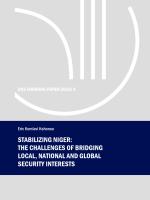France’s and the EU’s strategies to stabilize Niger
In this working paper Eric Hahonou investigates France’s and the EU’s strategies to stabilize Niger. French and EU policy-makers consider Niger’s stability of important to domestic security. This is largely due to Niger’s geographic position at the centre of the unstable Sahel region. Niger borders several countries affected by conflict where terrorist networks have been gaining ground, such as Mali, Nigeria, and Libya. Due to this position, its relative stability, and the long-term collaboration between Nigerien elites and western governments – France in particular – Niger is considered a key partner in western government’s stabilisation of the Sahel region. The common main objectives of French and EU stabilisation policy in Niger are to counter the spread of global Jihad, to stall criminal trans-border trade and migrations towards Europe. For France it is also an issue of protecting the uranium mines in the Agadez region, which supplies a significant part of the Uranium used in France’s power system, and in which it has a major economic stake. The main strategies of France and the EU to stabilize Niger have been direct intervention and capacity building of Nigerien security forces. For France and the EU reinforcing state security institutions and stabilizing elite rule constitute the only realistic path to defend their own interests. However, the working paper suggests that international support of Nigerien security forces could be counter-productive for the re-establishment of state authority and legitimacy in the long-term. Brutal repression and violation of human rights by Nigerien security forces especially in the impoverished Diffa region, where Boko Haram carried out attacks, in the name of state security has already severely undermined the legitimacy of the Nigerien government and the state itself. This in turn may push Nigeriens into radical movements such as Boko Haram.
The working paper suggests that collaborating with non-state security actors, which are important in the everyday provision of security for many people, such as reformist non-violent religious movement and rural militias could be a way to improve stabilisation strategies in Niger. It could confer more legitimacy on western stabilization strategies, and would be a way to include potential adversaries in the process of stabilisation. In this way, they could become a force for positive political change.
The working paper also suggests that more emphasis should be put on tackling the issue of corruption in the security forces. This would require real political commitment to formulate a coherent legal framework tackling the issue of corruption and the enforcements of its rules. If not sanctioned human rights abuses, predatory behaviour and extortion are likely to continue to weaken state legitimacy and deepen the rift between the state and large parts of the Nigerien populations.

